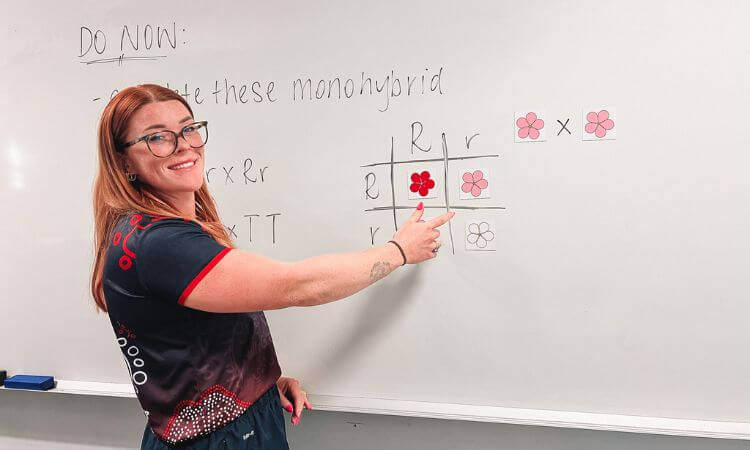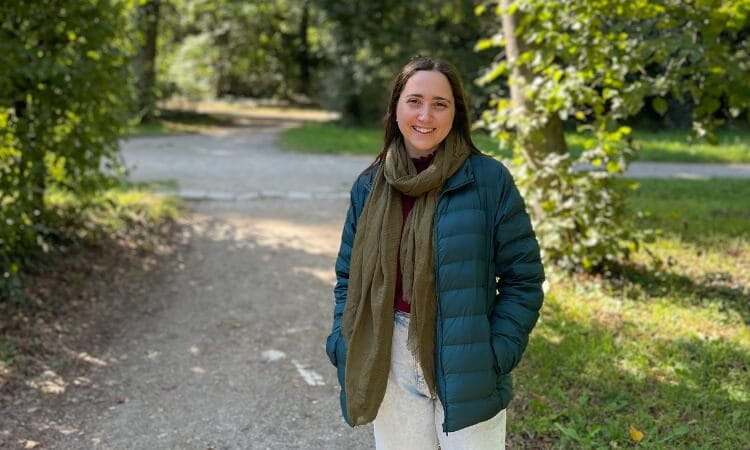‘It’s a calling’: From corporate climber to classroom educator
5 min read
22 Aug 2025

After years in fast-paced corporate and not-for-profit roles, one University of Southern Queensland (UniSQ) graduate made a bold decision to follow her passion for helping young people and discovered her true calling in the classroom.
Jaimee Crisp had spent years navigating the complexities of international trade, rail logistics, and corporate strategy. But despite her success, something was missing.
She decided to swap spreadsheets for science labs and boardrooms for classrooms, enrolling in UniSQ’s Master of Teaching and Learning (Secondary), supported by the Queensland Government’s Turn to Teaching (TTT) program.
We spoke with her to learn more about her experience.
Tell us about your study and career-change journey. How did you come to enter the TTT program?
Before entering the Master of Teaching and Learning (Secondary), I had already completed a Bachelor of Arts in English Literature and a Bachelor of Science in Biology. While completing my studies, I worked full-time in a not-for-profit organisation supporting disadvantaged young people across Queensland in a corporate capacity. In 2021, I transitioned into the role of Commodity Trader with an international trading firm, focusing on rail logistics and containerised trading of grain to Southeast Asia and China.
The TTT program offered an opportunity I couldn’t pass up. I was looking into postgraduate study options but found the employment uncertainty afterwards too great a risk. TTT gave me a way forward.
What motivated you to make the leap into teaching?
I’ve always had a strong drive to support young people – a passion that first found an outlet in the not-for-profit sector. But when I entered the corporate world, I started to feel a sense of disconnection. While the role was stimulating, I found myself in a cycle that, while lucrative, didn’t align with my values.
I’d long harboured the idea of becoming a teacher, but like many others, I was hesitant due to the public perception and lack of respect the profession often receives in Australia. Still, I believe that must change – and I want to be part of that change. Teachers play an enormous role in shaping young people’s lives, especially during their most formative years. For me, teaching isn’t jut a job – it’s a calling.
What did the TTT program involve, and what would you want others to know before signing up?
The TTT program is a remarkable opportunity for second-career professionals, providing financial stability and clear job prospects for those wanting to pivot into education. But it’s not for the faint-hearted. In the first year, you complete a full-time study load, which at UniSQ translates to 12 courses across the year due to the trimester structure.
Prospective students need to take a close look at their personal and financial circumstances. Can you balance study with your current career, as I did? Or do you have the capacity to reduce or step away from work altogether? Additionally, the program targets regional and rural teaching placements, so flexibility around relocation is important.
In the second year – your first year as a teacher – you move into a 0.5FTE teaching load (around 25 contact hours per fortnight), but it’s important to understand this still equates to full-time work once planning, preparation, and other duties are included.
The program is demanding, but the support is there. The TTT team, including UniSQ staff, help guide placements, and are committed to finding mutually beneficial teaching positions that align with Department of Education needs.
Why did you choose UniSQ for your postgraduate studies?
UniSQ has been a part of my academic journey for nearly a decade, so choosing it for my postgraduate studies was a natural fit. I’d already had a positive experience with both of my undergraduate degrees here, and being a local student, the flexibility and support UniSQ offers made it the obvious choice.
UniSQ appointed a dedicated TTT liaison to help our cohort navigate the program requirements alongside the Department of Education. That extra level of support really made a difference. The University fostered a strong community of practice among our group, encouraged collaboration, and provided generous extensions and online support when we needed it.
Where are you now, and how has the TTT program impacted your career?
Right now, I’m teaching Science and English at Toowoomba State High School. By the time you read this, I’ll have submitted my GTPA (Graduate Teacher Performance Assessment) and will be nearing the end of my first year in the classroom as part of the TTT program.
I’ve successfully met all the TTT Gradual Release Indicators and have obtained my graduate teaching registration. I’ll be staying on at Toowoomba State High School to complete the rest of my Department of Education contract – and beyond that, I’m committed to staying in the public system and working toward leadership roles within education.
Why are teachers so important, and why should we support more professionals transitioning into education?
I’ve long believed that secondary teachers should hold postgraduate qualifications. If we want to genuinely improve educational outcomes, we need to bring in second-career professionals who are subject matter experts and have lived experience outside of the school system.
Teachers today are more than educators – we are mentors, advocates, counsellors, and role models. Second-career teachers are uniquely equipped to bring life experience into the classroom, helping students not just learn content but also understand how it applies in the real world.
But it comes at a cost – financially, it’s a significant sacrifice for many of us to leave higher-paid careers. That’s why programs like TTT are vital. They lower the barrier to entry and offer stability, making the leap into teaching possible for professionals who otherwise wouldn’t have the means.
Without these pathways, we risk missing out on an entire cohort of skilled, passionate individuals who have so much to offer our students – and our future.
Is there anything else you’d like to add?
Undertaking the TTT program has been one of the best decisions I’ve ever made. It’s shifted my entire outlook on life and work and reminded me that we all have the power to be the change we want to see.
If we want better educational outcomes, we need skilled, passionate professionals in our classrooms. If you’re thinking about it – take the leap. You won’t regret it.
Jaimee Crisp had spent years navigating the complexities of international trade, rail logistics, and corporate strategy. But despite her success, something was missing.
She decided to swap spreadsheets for science labs and boardrooms for classrooms, enrolling in UniSQ’s Master of Teaching and Learning (Secondary), supported by the Queensland Government’s Turn to Teaching (TTT) program.
We spoke with her to learn more about her experience.
Tell us about your study and career-change journey. How did you come to enter the TTT program?
Before entering the Master of Teaching and Learning (Secondary), I had already completed a Bachelor of Arts in English Literature and a Bachelor of Science in Biology. While completing my studies, I worked full-time in a not-for-profit organisation supporting disadvantaged young people across Queensland in a corporate capacity. In 2021, I transitioned into the role of Commodity Trader with an international trading firm, focusing on rail logistics and containerised trading of grain to Southeast Asia and China.
The TTT program offered an opportunity I couldn’t pass up. I was looking into postgraduate study options but found the employment uncertainty afterwards too great a risk. TTT gave me a way forward.
What motivated you to make the leap into teaching?
I’ve always had a strong drive to support young people – a passion that first found an outlet in the not-for-profit sector. But when I entered the corporate world, I started to feel a sense of disconnection. While the role was stimulating, I found myself in a cycle that, while lucrative, didn’t align with my values.
I’d long harboured the idea of becoming a teacher, but like many others, I was hesitant due to the public perception and lack of respect the profession often receives in Australia. Still, I believe that must change – and I want to be part of that change. Teachers play an enormous role in shaping young people’s lives, especially during their most formative years. For me, teaching isn’t jut a job – it’s a calling.
What did the TTT program involve, and what would you want others to know before signing up?
The TTT program is a remarkable opportunity for second-career professionals, providing financial stability and clear job prospects for those wanting to pivot into education. But it’s not for the faint-hearted. In the first year, you complete a full-time study load, which at UniSQ translates to 12 courses across the year due to the trimester structure.
Prospective students need to take a close look at their personal and financial circumstances. Can you balance study with your current career, as I did? Or do you have the capacity to reduce or step away from work altogether? Additionally, the program targets regional and rural teaching placements, so flexibility around relocation is important.
In the second year – your first year as a teacher – you move into a 0.5FTE teaching load (around 25 contact hours per fortnight), but it’s important to understand this still equates to full-time work once planning, preparation, and other duties are included.
The program is demanding, but the support is there. The TTT team, including UniSQ staff, help guide placements, and are committed to finding mutually beneficial teaching positions that align with Department of Education needs.
Why did you choose UniSQ for your postgraduate studies?
UniSQ has been a part of my academic journey for nearly a decade, so choosing it for my postgraduate studies was a natural fit. I’d already had a positive experience with both of my undergraduate degrees here, and being a local student, the flexibility and support UniSQ offers made it the obvious choice.
UniSQ appointed a dedicated TTT liaison to help our cohort navigate the program requirements alongside the Department of Education. That extra level of support really made a difference. The University fostered a strong community of practice among our group, encouraged collaboration, and provided generous extensions and online support when we needed it.
Where are you now, and how has the TTT program impacted your career?
Right now, I’m teaching Science and English at Toowoomba State High School. By the time you read this, I’ll have submitted my GTPA (Graduate Teacher Performance Assessment) and will be nearing the end of my first year in the classroom as part of the TTT program.
I’ve successfully met all the TTT Gradual Release Indicators and have obtained my graduate teaching registration. I’ll be staying on at Toowoomba State High School to complete the rest of my Department of Education contract – and beyond that, I’m committed to staying in the public system and working toward leadership roles within education.
Why are teachers so important, and why should we support more professionals transitioning into education?
I’ve long believed that secondary teachers should hold postgraduate qualifications. If we want to genuinely improve educational outcomes, we need to bring in second-career professionals who are subject matter experts and have lived experience outside of the school system.
Teachers today are more than educators – we are mentors, advocates, counsellors, and role models. Second-career teachers are uniquely equipped to bring life experience into the classroom, helping students not just learn content but also understand how it applies in the real world.
But it comes at a cost – financially, it’s a significant sacrifice for many of us to leave higher-paid careers. That’s why programs like TTT are vital. They lower the barrier to entry and offer stability, making the leap into teaching possible for professionals who otherwise wouldn’t have the means.
Without these pathways, we risk missing out on an entire cohort of skilled, passionate individuals who have so much to offer our students – and our future.
Is there anything else you’d like to add?
Undertaking the TTT program has been one of the best decisions I’ve ever made. It’s shifted my entire outlook on life and work and reminded me that we all have the power to be the change we want to see.
If we want better educational outcomes, we need skilled, passionate professionals in our classrooms. If you’re thinking about it – take the leap. You won’t regret it.
Related news
1 min read
12 Feb 2026
5 min read
19 Jan 2026
5 min read
17 Dec 2025


